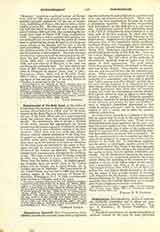

Comissions, ECCLESIASTICAL, bodies of ecclesiastics juridically established and to whom are committed certain specified functions or charges. They are: I. Pontifical; II. Roman Prelatitia l; III. Diocesan.
I. Pontifical commissions are special committees of cardinals created by the pope for some particular purpose, e.g. for the proper interpretation and defense of Sacred Scripture (see Biblical Commission), for historical studies (see Ecclesiastical History), for the codification of the canon law (see Law), for the supervision, correction, etc. of the liturgical books of the Roman Church, e.g. the Breviary, Missal, Pontifical, Ritual, etc. (see Breviary; Liturgy), for the restoration and perfection of ecclesiastical music (see Gregorian Chant), for the reunion of dissenting churches (see Eastern Churches), for the preservation of the Faith (see Italy; Rome).
Prelatitial commissions are composed of Roman prelates, secretaries, consultors, etc., and may be presided over by a cardinal. Such, e.g., are the Commission of Sacred Archeology (see Christian Archaeology), for the preservation and illustration of the Christian antiquities of Rome, the commission for the administration of Peter’s-pence (q.v.), and the Palatine Commission (established by Leo XIII) for the settlement of controversies or lawsuits between the personnel of the Vatican or other papal residences. Most of these commissions, however, are attached to the Roman Congregations, as special departments or sections, and are described in the article Roman Congregations. e.g. the Liturgical Commission attached to the Congregation of Rites; the commissions for the examination of episcopal reports, for the revision and correction of the liturgical books of the Eastern Churches (q.v.), and for the examination of religious institutes in Propaganda territory, all three attached to the Congregation of Propaganda; for the examination of new religious institutes attached to the Congregation of Bishops and Regulars; for the selection of bishops in Italy (now suppressed and its attributions vested in the Congregation of the Inquisition).
The diocesan commissions provided for by general ecclesiastical law are four: the commission for seminaries (in two sections for spiritual and temporal concerns, respectively), according to the Council of Trent (Sess. XXIII, cap. xviii, De ref.), for which see Ecclesiastical Seminary ; the commission of examiners of the clergy (see Synodal Examiners), to aid in the control of all competition for vacant parochial benefices; the commission on sacred music (Motu proprio of Pius X, November 22, 1903) for the improvement of the character and execution of ecclesiastical music in the churches; a vigilance committee (Consilium a vigilantia) for the repression of modernism (Pius X, “Pascendi Dominici Gregis”, September 8, 1907). In many dioceses of England there exist diocesan school commissions or associations. There exists also in England (since 1853) for each diocese a commission of investigation for criminal and disciplinary causes of ecclesiastics (Taunton, 210-213); a similar commission for the dioceses of the United States, established by Propaganda in 1878, was abrogated in 1884 in favor of a new form of procedure, detailed in the Instruction of that year, “Cum Magnopere”. For Ireland see “Acta et Decreta”, by the Synod of Maynooth (1900), p. 75; and for Scotland, Taunton, op. cit., 214-20. The scope, authority, and attributions of these bodies are described either in the pontifical documents that create them, or in the legislation pertaining to the Roman congregations, or in the common ecclesiastical law and its authoritative interpretations.
THOMAS J. SHAHAN

